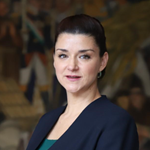Financial crime such as money laundering, corruption, tax evasion, and fraud, continue to pose a significant threat to IMF members’ financial sectors and the broader economy and can have negative macro-critical impacts. Recognizing the macro-criticality of these isues, the IMF has increasingly stepped-up efforts in this area over the years, including by integrating financial integrity and governance reforms in all its core functions and across several IMF policies, including 2018 Framework for Enhanced Fund Engagement on Governance, 2023 Review of the Fund's AML/CFT Strategy. This high-level, public event, organized jointly by LEG, MCM, FAD, and SEC, will provide an opportunity to: discuss the macroeconomic impact of financial crime, fraud, and corruption, exchange views on country responses to tackling financial crime and implementing broader governance reforms as structural pillars of growth and stability, communicate progress on implementing the IMF’s 2023 quinquennial AML/CFT Strategy and the recent G7 Call to Action on Financial Crime, and engage in dialogue on the evolving fraud threat landscape and policy priorities. Following the opening remarks by DMD Bo Li, the event will feature two panels: one focusing on the macroeconomic impact of financial crime, fraud, and the other on corruption, and country experiences in tackling financial crime and advancing AML/CFT and governance reforms.









